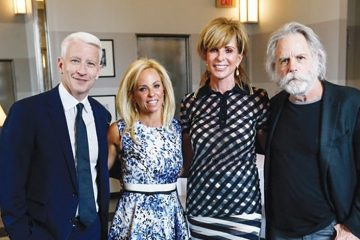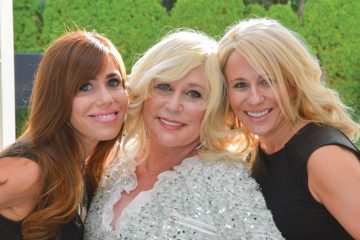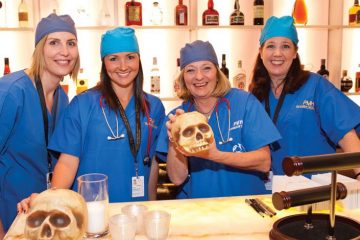Pillar of Strength: Nancy Pencer
Fourteen years have passed since Nancy Pencer lost her husband. “I never thought that I would not grow old with him,” she says, just two days before the anniversary of Gerald Pencer’s death. Her eyes carefully hold tears captive, and as she pauses to swallow and take a deep breath, you can hear it. Sitting on a crème loveseat in the angelically white drawing room of her Windsor Arms penthouse, Pencer is surrounded by meaningful mementos that the former president and CEO of Cott Corporation left behind. From Group of Seven artist Lawren Harris’s landscape pieces, to contemporary icon Alex Katz’s “Ruth”, Gerry’s revered works are now abstract displays of affection worth thousands of words. The most poignant perhaps, is a portrait of Andy Warhol by Canadian artist Philip Iverson, which hangs on a wall directly across from her. For reasons she can’t explain, Pencer was drawn to the painting when she eyed it a charity auction in 2006. After purchasing it, she was told that the artist had died a month earlier from brain cancer, an illness she’s become intimately familiar with since a form of it took her husband’s life and put her on a mission to carry out his legacy as president of The Gerry and Nancy Pencer Brain Trust.
Against the backdrop of Toronto’s telling skyline, she reflects on the unorthodox first encounter that sparked a series of spontaneous events. The date was March 19, 1966, a week before her 19th birthday. “We met on a blind double-date, except he was with my friend and I was with his friend, and we kind of hit it off and then that was it. Three months later we were engaged,” says the Montreal native. Gerry’s big dreams and bullish outlook towards business and life impressed Pencer, who had just graduated high school and was working at a doctor’s office as a nurse’s assistant at the time. “He always took risks and it was exciting to be with him … [When] I met Gerry my whole world just changed and evolved, he was a very special man.”
Gerry’s roll-the-dice temperament took the pair and their three kids, Stacey, Holly and Clarke, from Montreal to Calgary, where he transformed a Honda dealership into Financial Trustco Capital Ltd., a $2 billion financial services firm that eventually brought the family to Toronto when the resounding sounds of fluid business signalled expansion. Risks are often rewarding, but not always, and in Gerry’s case, the stock market crash of 1987 forced him to step aside. “I always knew that Gerry was going to bounce back because he had a lot of challenges in his life business wise, and he just picked up the pieces and he carried on. When the stock market crashed, he really took it much harder than any other time, any other challenge, and it took him about a year to pull himself together and then he went into Cott, which was his
father’s company.”
It was at Cott that Gerry had some of his best and worst days. When he stepped in as chairman and CEO of the private label soft drink manufacturer in 1988, it was a little known company with a barely-there share price. He immediately began building relationships with retailers and remodelled it into a billion-dollar, internationally recognized brand. “He just took the company up and it was unbelievable,” says Pencer. She goes on to recall the spring of 1997, when an ominous cloud suddenly overshadowed his triumphs in business. “He was in the middle of negotiating a multi-million dollar deal and he developed a seizure. I was working at Cott at the time doing their HR work, and he came into my office and said, ‘Something is wrong, let’s go home.’” A few days later, he was diagnosed with grade IV glioblastoma multiforme, a malignant brain tumour that grows rapidly and would require awake-brain surgery, followed by intensive radiation treatment and chemotherapy. Pencer was stunned. They returned home from the doctor’s office to break the news to the family. “Everybody was kind of in shock and crying. His first words were: ‘Don’t feel sorry for me, I’ve had a wonderful life, I’ve lived 104 years in 52 years.’”
What the Pencer’s discovered through Gerry’s aggressive condition is that there wasn’t much information or support for patients with brain tumours. Their wealth was not a barometer of the care he’d receive in this arena, and their ability to travel anywhere in the world brought them right back to Toronto. “I went on the Internet a lot and, you know, I went on support groups and things like that, but really there was nowhere to go, to turn, and Gerry decided in his visionary way that whether he got better or whether he died he didn’t care, he was going to open a brain tumour centre at Princess Margaret Hospital,” she says, highlighting the $4 million pledge he made to fund The Gerry and Nancy Pencer Brain Tumor Centre. Though he didn’t live to see it open in November 1998, Gerry is survived by a legacy that has risen to become Canada’s largest, most active multidisciplinary centre for patients with brain tumours in the world, treating more than 150 people weekly. Through his role as the facility’s medical director, Gerry’s neuro oncologist Dr. Warren Mason has made groundbreaking contributions in his field, and has witnessed the profound impacts. “If he had been diagnosed with the same disease today, he would have had a different outcome. I know so. He was on the cusp, it was just before we made some very significant breakthroughs … what he did has helped us to contribute to really making a difference for people,” he says, from the 18th floor of Princess Margaret Hospital.
Gerry’s end is where Pencer’s philanthropic journey began. She immediately picked up where he left off, and has been vigorously fundraising for the centre through Pencer Brain Trust, a not-for-profit foundation aimed at improving quality of life for brain tumour patients. “Nancy’s a lovely woman, she’s very kindhearted and she’s genuine,” says Dr. Mason, who saw Pencer yesterday at a board meeting. “Gerry died fourteen years ago this week and the family is as involved as ever,” he adds. It’s her responsibility, she says, to carry out his legacy. She does it the best way she knows how: generating a buzz, rallying supporters and throwing parties that increase awareness and consistently end up in the papers. It’s a role she wears well. “I’m the person who raises the money!” she says in response to her informal job description.
Pencer Brain Trust’s annual spring gala is considered one of the hottest tickets in Toronto, with guests and sponsors topping 1,000 and annual net-proceeds averaging $500,000. Each elaborate soiree has a distinct theme, from Circus Circus to South Beach, and has raised more than $5 million in the last decade. Her relentless approach to fundraising is palpable, even in this very moment. “I want to plug that we’re having our event at Liberty Grand on May 30th. This year the theme is rock!” she unfalteringly says, of the imminent gala, which will feature rock icon Joan Jett and the Blackhearts. Pencer’s golden hair and quintessential bangs pop against her dark Givenchy blazer, and her hot pink J Brand jeans somehow seem demure, more like a muted blue, when worn by such a vibrant personality. A personality precisely fit for the assured nature of fundraising.
The milky marble floors that cover Pencer’s apartment have been the platform of many public and private affairs that stretch across dozens of causes, including the much-written and raved about dinner she hosted in 2006 to raise money for The National Ballet of Canada’s production of Petrouchka. “We admire our mother’s grace, class and charm; her empathy toward others is also amazing,” says Holly Pencer-Bellman, who’s taken initiative as a Brain Trust officer, along with her sister, Stacey Cynamon. Robin Turack can attest to this. It was a tragic turn of events that brought the fellow fundraiser in contact with Pencer, which led to a deep connection. “I’ll never forget the day she picked up the phone to call me when my daughters Sydney and Sammi created the Blue Brain Bracelet to raise money for The Gerry and Nancy Pencer Brain Tumor Centre, where my late husband Fred was getting his treatment. Her empathy and compassion for our circumstances was so authentic,” says Turack, adding that Pencer was the first person to visit after her husband died and was often seen stacking 10 bracelets at a time on one wrist.
A week from now, Pencer will be taking a break to travel to India with her partner Michael Benjamin, president of Benjamin’s Park Memorial Chapel, who she was introduced to nearly nine years ago and connected with over both having lost their spouse. “I try and live in the moment, and that’s something that I’ve learned by going to India. It’s interesting that the people there, you know, there’s very poor and there’s middle-class, and the very poor, you can’t even feel sorry for them because they’re always smiling and they’re just happy with what they have and they don’t know any other way, so I’ve had a very spiritual experience every time I’ve gone there,” she says.
Before Gerry died, he wrote a memoir called The Ride of My Life, where he penned his journey post-diagnosis. “If my life has taught me anything, it’s that what may seem to be the worst tragedy or mistake can turn out to have positive implications,” he wrote. Pencer seems to have taken these words to heart.































































































No Comment